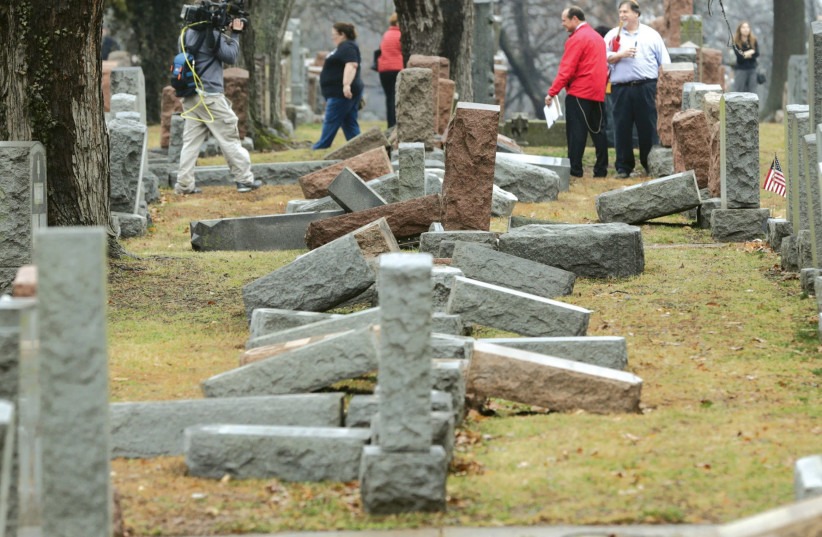Three years after the deadliest attack on Jews in American history, the wake-up call that emanated from Pittsburgh is not ringing as loudly now.
New American Jewish Committee (AJC) surveys found 46% of American Jews and 37% of the general US population think antisemitism is taken less seriously than other forms of hate and bigotry.
Only 15% of the general and 16% of the Jewish population say hatred of Jews is regarded more seriously,
Younger Jews are more cynical than older ones. More than half, 53%, of 18-35-year-olds think antisemitism is considered less seriously, compared to 41% of Jews ages 36-49, 47% of ages 50-64, and 39% of those 65 and over.
The outpouring of empathy from Americans of all faiths, ethnicities and ages following the murder of 11 Jewish worshipers at Tree of Life Congregation Shabbat services on October 27, 2018, was heartening. Many came the following Saturday morning to synagogues across the nation, to participate in solidarity, clearly stating by their presence that American Jews are not alone. At the time there was a discernible recognition by non-Jews that threats and attacks against Jews is a societal problem that requires mobilizing all sectors of American society to effectively fight it.

But the attention to Jewish concerns about endless antisemitism, even after additional fatal attacks in Poway, Monsey and Jersey City, turned out to be more transient than enduring. African-American grievances about long-standing and current injustices came to the forefront in media attention and national conversations following a policeman’s murder of George Floyd. Asian-Americans became the targets of unprecedented levels of violence and threats as the coronavirus spread.
Yet targeting Jews still tops the annual FBI Hate Crimes Statistics Report, a list known to be an inadequate compilation, as it depends on voluntary submissions from local law enforcement agencies across the nation.
While 90% of American Jews consider antisemitism in the US a problem today, and 82% say the age-old hatred of Jews has increased over the past five years, confidence in key government institutions expected to respond constructively is eroding. In AJC’s 2021 Survey of American Jews, 31% said law enforcement is not too effective or not at all effective in responding to the security needs of Jews.
Though 66% said that law enforcement is effective in responding to the security needs of Jews, only 17% said they are very effective. That’s a significant downturn from the findings in the two previous annual AJC surveys on antisemitism in the US. In 2020, 81%, and in 2019, 79%, said law enforcement was at least somewhat effective. In 2019, 15% said they were not effective.
Younger American Jews are less likely than older cohorts to find law enforcement effective in responding to Jewish security needs. The 2021 AJC survey found that 58% of those ages 18-39, 65% of ages 36-49, 75% of 50-64, and 68% of 65 and over consider the response of law enforcement very or somewhat effective.
Congress, too, gets a low vote of confidence. While 28% of American Jews approve, and only 3% strongly approve, of how Congress has been responding to antisemitism, 50% disapprove, with 23% disapproving strongly.
Enhanced uneasiness about Jewish security is illustrated in the 39% of American Jews who altered their behavior over the past 12 months out of concern for their safety. That includes individuals who have avoided publicly wearing items that may help others identify them as Jewish, avoided going to certain places or attending certain events, or avoided posting content online that may reveal their views on Jewish issues.
The general US population continues to lag behind the Jewish community in recognizing the severity of antisemitism in America today. Only 60% think antisemitism is a problem today, and 44% think it has increased over the past five years.
Disturbingly, 34% of the general American population has never head the term “antisemitism” or has heard it and does not know what it means. The fact that a year ago 46% were equally unaware of the term may indicate progress. But it is worrisome that only 66% of non-Jewish Americans say they know what antisemitism means.
It raises the question of whether a change in terminology is needed to boost understanding of what constitutes antisemitism. To that end, Jewish respondents were asked in the 2021 survey whether they prefer the term “Jew-hatred” or “antisemitism.” Nearly three-quarters, 73%, chose “antisemitism,” while 14% selected “Jew-hatred.”
That’s just as well. In the general population survey, only 35% were familiar with the Jew-hatred term and know what it means, while 24% had heard it but were unsure what it means, and 41% said they had never heard of the term.
Clearly, there is a lot to be done to educate Americans, and especially elected officials and critical government institutions, about confronting antisemitism without introducing a change of terminology. That 24% of American Jews reported in the AJC survey that they were targets of antisemitism in the past 12 months should concern all.
A vigorous renewal of the wake-up call to deal with antisemitism in the United States is imperative.
The writer is the American Jewish Committee’s director of media relations.
